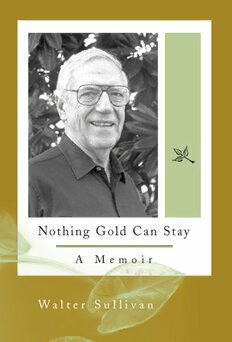
Nothing Gold Can Stay: A Memoir PDF
209 Pages·2006·0.647 MB·English
Most books are stored in the elastic cloud where traffic is expensive. For this reason, we have a limit on daily download.
Preview Nothing Gold Can Stay: A Memoir
Description:
In his enduring fiction and criticism, Walter Sullivan has invited readers to share the thoughts of a penetrating, contemporary intellect. Now he turns his pen on his own life to forge a stirring memoir that fondly recounts the life of the mind. From childhood in 1920s Nashville, where his father died three months after he was born, to the halls of Vanderbilt University, where he taught creative writing for more than fifty years, Sullivan recalls key episodes in his life—often pausing to ponder why some memories of seemingly trivial events persist while others, seemingly more important, have faded from view. As witness to a series of social and cultural moments, Sullivan passes on his sharp observations about depression and war, southern renascence and civil rights. He also includes lively anecdotes and sharp character sketches, with personalities ranging from his grandmother “Chigger” and Sally Fudge—who had lived through the Civil War and was said to attend the funerals of people she didn’t know—to Mrs. Gertrude Vanderbilt, with whose eccentricities he sometimes had to contend. Readers will discover a treasure trove of insights, as Sullivan’s views of academic life are complemented by remembrances of important writers: John Crowe Ransom, Robert Lowell, Eudora Welty, Robert Penn Warren, James Dickey, Flannery O’Connor, and a host of others, blending the formal and familiar in a style befitting a lingering southernness. He also recalls his shock at being branded a racist by Kingsley Amis and addresses issues of race in academia and southern culture. Throughout his career, he sees himself as a guardian of lost causes, continuing to teach an appreciation of literature in the face of encroaching post-structuralism and political correctness. Laced with humor while maintaining a profound seriousness about what really matters in life, Nothing Gold Can Stay is a lively narrative of a life well lived that will charm any reader interested in American society during and after the Great Depression. Graced with emotional coherence achieved by an almost ironic tone that is sustained from first sentence to last, it is a book in which a distinguished writer considers his world—and his own mortality—and leaves us richer for it.
See more
The list of books you might like
Most books are stored in the elastic cloud where traffic is expensive. For this reason, we have a limit on daily download.
